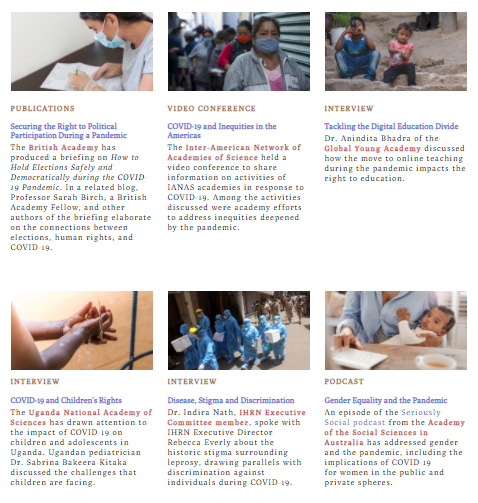
Human Rights
& COVID-19
Virtual Public Event
December 2020
Program
INTRODUCTORY REMARKS
KEYNOTE ADDRESS: Towards a Human Rights-Based Approach to COVID-19
VIRTUAL PANEL 1: COVID-19 & Human Rights: Perspectives on Socio-economic Rights and Violence
VIRTUAL PANEL 2: Health Inequities, Human Rights & COVID-19
NATIONAL ACADEMIES REPOSITORY: Human Rights & COVID-19
The COVID-19 pandemic has exposed and exacerbated inequalities throughout the world, and it has had significant implications for a range of internationally protected human rights. National academies, and the broader scientific community, have undertaken a number of activities to help address these concerns.
On December 7, 2020, the International Human Rights Network of Academies and Scholarly Societies (IHRN) and the Academy of Science of South Africa (ASSAf) jointly presented a virtual event to highlight key rights-related challenges associated with the COVID-19 pandemic.
Introductory Remarks
Ida Nicolaisen, Executive Committee member of the IHRN, and Jonathan Jansen, President of ASSAf, provide opening remarks about the IHRN-ASSAf collaboration and the role of national academies in promoting human rights.
Ida Nicolaisen
Member, IHRN Executive Committee; Senior Research Fellow, Nordic Institute of Asian Studies, Copenhagen University
Jonathan Jansen
President, Academy of Science of South Africa
Keynote Address: Towards a Human Rights-Based Approach to COVID-19
The pandemic has thrown the connections between science, health, and human rights into sharp relief. In this keynote address, global health expert Lawrence Gostin discusses important implications of COVID-19 for the right to health, civil liberties, and social justice, and offers suggestions for integrating human rights into pandemic response efforts.
Lawrence Gostin
Director of the O'Neill Institute for National and Global Health Law at Georgetown University Law Center

COVID-19 & Human Rights: Perspectives on Socio-economic Rights and Violence
South Africa, like other countries worldwide, was forced to impose lockdowns to curb the spread of COVID-19 since March 2020. While the measures taken by the government aided in slowing down the spread of the pandemic, they have had far-reaching consequences for a range of socio-economic rights, such as the right to education, food and work. They have also had serious consequences for civil and political rights, including through a rise in the levels of domestic violence, and because of the use of force by law enforcement officials in imposing these measures.
This panel discussion, hosted by ASSAf, explores the impact of COVID-19 on socio-economic human rights and violence faced by citizens.
PANELISTS
Rachel Jewkes
Executive Scientist: Research Strategy, South African Medical Research Council
Christoper Mbazira
Professor of Law, Makarere University, Uganda
Sandy Liebenberg
HF Oppenheimer Chair in Human Rights Law, University of Stellenbosch and Vice-Chair, UN Committee on Economic, Social and Cultural Rights
MODERATOR
Christof Heyns
Professor of Law, University of Pretoria, MAASf; Member of the UN Human Rights Committee

Health Inequities, Human Rights & COVID-19
Communities of color in the United States have been disproportionately impacted by the COVID-19 pandemic, reflecting deeply entrenched health and social inequities in the country.
In this webinar, hosted by the Committee on Human Rights of the U.S. National Academies of Sciences, Engineering, and Medicine, panelists discuss strategies for confronting this health and human rights challenge, including through priority access to COVID-19 vaccines.
PANELISTS
Ana Diez Roux
Dean and Distinguished University Professor of Epidemiology, Dornsife School of Public Health, Drexel University/Director, Drexel Urban Health Collaborative
Greg Millett
Vice President and Director of Public Policy at amfAR, The Foundation for AIDS Research
Saeed Omer
Director, Yale Institute for Global Health; Associate Dean (Global Health Research), Yale School of Medicine; Professor of Medicine (Infectious Diseases), Yale School of Medicine; and Susan Dwight Bliss Professor of Epidemiology of Microbial Diseases, Yale School of Public Health
CHAIR
Alicia Ely Yamin
Lecturer on Law and Senior Fellow at the Petrie-Flom Center for Health Law Policy, Biotechnology and Bioethics at Harvard Law School/Senior Advisor on Human Rights at Partners in Health

Human Rights & COVID-19 Repository
Through their research and other activities, many national academies are examining the connections between science, engineering, health and human rights and working to promote rights-based approaches to the pandemic.
To highlight this important work, the IHRN has created a repository with selected academy activities in this area. The repository, which includes reports, statements, webinars, interviews, and other resources on a variety of human rights-related topics, will be continually expanded. The IHRN invites academies to contact it with information concerning relevant initiatives.
Statements, recommendations, and opinions contained in the above video features do not necessarily reflect the views of the IHRN.














